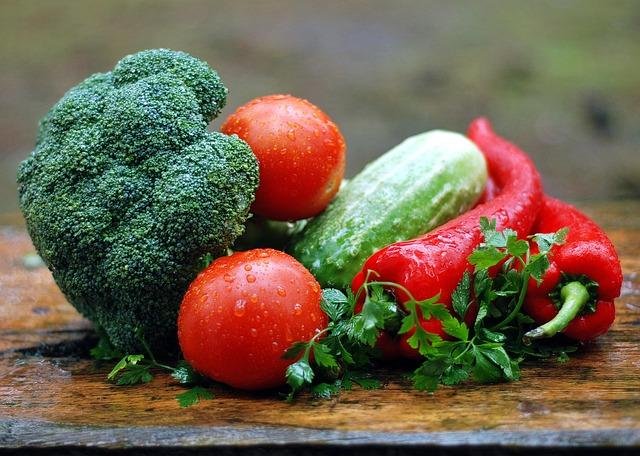In a world where time feels perpetually limited and the daily scramble to decide “what’s for dinner?” can become a source of stress, weekly meal planning emerges as a quiet hero. Far from being just a mundane chore, it holds the promise of bringing order and ease into our hectic lives. By thoughtfully mapping out meals in advance, we unlock a host of benefits—ranging from healthier eating habits to saving money and reducing food waste. This article delves into how a simple weekly ritual can transform not just your kitchen routine, but your overall well-being.
Table of Contents
- The Power of Predictability in Your Weekly Meals
- Enhancing Nutritional Balance with Thoughtful Planning
- Saving Time and Reducing Stress Through Organized Cooking
- Smart Grocery Shopping Tips to Maximize Budget and Freshness
- Fostering Healthy Eating Habits for the Whole Family
- Adapting Your Meal Plan for Flexibility and Seasonal Produce
- Q&A
- Final Thoughts

The Power of Predictability in Your Weekly Meals
Embracing a predictable meal schedule simplifies your week, transforming daily decisions from stressful to seamless. When you know what’s on the menu ahead of time, your shopping becomes strategic, your kitchen operations flow smoothly, and mealtime anxiety diminishes. This consistency helps build a rhythm, making it easier to maintain balanced nutrition and reduce reliance on impulsive, often less healthy, food choices. The power lies in turning meal prep from a daunting task into a guided routine, freeing up mental space for other priorities.
Key advantages include:
- Efficient grocery trips that save time and money
- Reduced food waste by using ingredients purposefully
- Enhanced portion control and balanced eating
- Greater confidence in cooking skills through repetition
| Day | Meal Type | Example |
|---|---|---|
| Monday | Dinner | Grilled chicken salad |
| Wednesday | Lunch | Veggie stir-fry with quinoa |
| Friday | Dinner | Salmon with roasted vegetables |

Enhancing Nutritional Balance with Thoughtful Planning
Careful meal planning allows you to achieve a harmonious nutritional profile throughout the week by intentionally incorporating a variety of food groups. Rather than scrambling last minute for meals, you can focus on balancing macronutrients such as proteins, carbohydrates, and healthy fats, alongside essential vitamins and minerals from fruits and vegetables. This deliberate approach helps prevent dietary gaps and supports overall wellness, ensuring each meal contributes positively to your health goals.
Consider this simple guide to a balanced week’s meals:
- Proteins: Lean meats, legumes, and tofu
- Carbohydrates: Whole grains, root vegetables
- Fats: Nuts, seeds, olive oil
- Fiber: Fruits, leafy greens, beans
| Day | Main Focus | Example Meal |
|---|---|---|
| Monday | High Protein | Grilled chicken with quinoa & steamed broccoli |
| Wednesday | Fiber Boost | Black bean salad with mixed greens & avocado |
| Friday | Healthy Fats | Salmon with a walnut and kale pesto |

Saving Time and Reducing Stress Through Organized Cooking
Investing a little time upfront to outline your meals can dramatically shrink the hours spent staring blankly into the fridge after a long day. By setting aside just an afternoon to plan and prep, you create a stress-free cooking environment where decisions are made ahead, groceries are precisely bought, and last-minute scramble is eliminated. This organizational approach turns daily meal preparation into a seamless routine, freeing up valuable time that can be redirected towards relaxation, family, or hobbies.
Consider the practical benefits: planned meals reduce impulse purchases, minimize food waste, and bring nutritional balance to your week. Here’s a quick glance at how much time you can save with a solid plan versus spontaneous cooking:
| Activity | Without Planning | With Weekly Meal Planning |
|---|---|---|
| Daily meal decision time | 15 minutes | 0 minutes |
| Grocery trips per week | 4-5 trips | 1 trip |
| Average daily cooking time | 45 minutes | 35 minutes |
- Smooth workflow: Know exactly what to cook and when.
- Reduced stress: No more last-minute ingredient hunts.
- Enhanced variety: Plan diverse dishes that keep mealtimes exciting.

Smart Grocery Shopping Tips to Maximize Budget and Freshness
One of the smartest moves you can make to stretch your food budget and keep ingredients fresh is to approach grocery shopping with a strategic plan in mind. Planning your meals ahead reduces the tendency to buy on impulse, which often leads to waste and overspending. By mapping out your meals for the week, you buy only what you need, reducing excess that might spoil before use. This strategy not only conserves money but also guarantees you enjoy fresher, more flavorful meals because ingredients are used close to their peak.
In addition to trimming expenses and improving freshness, weekly meal planning saves critical time during busy days by eliminating daily “what’s for dinner?” dilemmas. It allows you to diversify your menu, avoid repetitive meals, and manage dietary goals with ease. Implementing a simple system such as a shopping list categorized by food groups enables you to navigate the store efficiently and unaffected by distractions.
- Create a dynamic shopping list: Divide by produce, dairy, proteins, and staples.
- Take inventory first: Avoid buying duplicates by checking what’s already in your pantry.
- Prioritize perishables: Plan meals around fresh produce early in the week.
- Use sales and coupons: Align your meal choices with weekly promotions.
| Meal Type | Ideal Shopping Day | Freshness Tip |
|---|---|---|
| Breakfast | Monday | Buy fresh fruits early for the week |
| Lunch | Wednesday | Midweek fresh veggies replenish |
| Dinner | Friday | Plan proteins for weekend freshness |

Fostering Healthy Eating Habits for the Whole Family
Creating a routine around nutritious meals encourages everyone in the family to make healthier choices without the last-minute stress of deciding what to eat. By planning meals ahead, you can incorporate a balanced variety of fruits, vegetables, whole grains, and lean proteins that cater to each family member’s needs and preferences. This proactive approach not only helps in managing portion sizes but also reduces the temptation to opt for fast food or processed snacks, promoting overall well-being and sustained energy throughout the day.
Beyond the nutritional advantages, weekly meal planning fosters valuable family bonding opportunities. Involving children in selecting recipes or prepping meals can teach them essential cooking skills and a greater appreciation for wholesome food. Additionally, it simplifies grocery shopping and budget management by allowing you to purchase exactly what is needed, minimizing waste. Consider the following simple benefits that come with nurturing this habit:
- Consistent Nutrient Intake: Ensures balanced meals every day.
- Reduced Food Waste: Buy only what you need.
- Time Savings: Less daily decision fatigue.
- Family Engagement: Kids learn and participate.
- Cost Efficiency: Avoid impulsive food purchases.

Adapting Your Meal Plan for Flexibility and Seasonal Produce
Introducing flexibility into your meal plan can transform weekly cooking from a rigid task into an enjoyable routine. Instead of locking yourself into specific recipes, consider creating a framework that allows for ingredient swaps and spontaneous choices. Emphasizing seasonal produce not only boosts the flavor and nutrition of your meals but also supports local farmers and reduces environmental impact. For instance, substituting summer berries for winter citrus in your breakfast bowls keeps your plan fresh and aligned with nature’s rhythm.
To help you adapt your meal plan creatively, keep a handy list of versatile pantry staples and seasonal highlights ready. This approach encourages experimentation without the stress of last-minute grocery runs. Here’s a quick guide to seasonally inspired swaps that can breathe new life into your weekly plan:
- Spring: Asparagus, peas, ramps
- Summer: Tomatoes, zucchini, peaches
- Fall: Pumpkins, apples, Brussels sprouts
- Winter: Kale, citrus, root vegetables
| Season | Flexible Ingredient | Simple Meal Idea |
|---|---|---|
| Spring | Peas | Fresh pea salad with mint |
| Summer | Zucchini | Grilled zucchini pasta |
| Fall | Apples | Apple and walnut quinoa bowl |
| Winter | Root veggies | Roasted root vegetable stew |
Q&A
Q&A: Exploring the
Q1: What exactly is weekly meal planning?
A1: Weekly meal planning is the practice of organizing and deciding your meals for the entire week ahead of time. It often involves creating a menu, making grocery lists, and prepping ingredients in advance to streamline daily cooking.
Q2: How does weekly meal planning save time during busy weeks?
A2: By deciding what to cook before the week begins, you eliminate the daily “What’s for dinner?” dilemma. With ingredients ready and recipes set, cooking becomes a quicker, more focused task, freeing up time for other priorities.
Q3: Can meal planning improve my diet quality?
A3: Absolutely. When you plan meals ahead, you’re more likely to incorporate a balanced variety of nutrients because you can thoughtfully choose recipes rather than resorting to last-minute convenience foods that might be less healthy.
Q4: What impact does meal planning have on grocery shopping?
A4: Meal planning turns grocery shopping into a targeted mission. You buy only what you need, which reduces impulse purchases, minimizes waste, and often saves money by decreasing food spoilage.
Q5: Does weekly meal planning help reduce stress related to food?
A5: Yes, it does. Knowing what you’ll eat each day removes the uncertainty and pressure of daily cooking decisions, making mealtimes more relaxed and enjoyable.
Q6: Is meal planning adaptable for different lifestyles and preferences?
A6: Definitely. Whether you’re vegetarian, follow a specific diet, or have picky eaters at home, meal planning can be customized to suit diverse tastes and nutritional needs, making it a versatile tool for anyone.
Q7: How can a beginner start with weekly meal planning without feeling overwhelmed?
A7: Start small—plan just a few dinners per week and gradually increase as you get comfortable. Use simple recipes, make a grocery list, and prep some ingredients ahead. Over time, it becomes an intuitive and rewarding routine.
Q8: Are there any long-term benefits beyond daily convenience?
A8: Weekly meal planning fosters healthier habits, reduces food waste, and can improve financial management. It cultivates mindfulness about nutrition and consumption that often leads to lasting positive lifestyle changes.
Q9: Can meal planning support weight management goals?
A9: Yes, by controlling portion sizes and ingredients, meal planning helps maintain consistency, avoid overeating, and supports thoughtful choices aligned with weight management or other wellness objectives.
Q10: What tools or resources can assist with weekly meal planning?
A10: Plenty! Apps, printable planners, recipe websites, and even community cookbooks can simplify the process. Experiment to find what fits your style—whatever helps bring order and ease to your kitchen routine.
Final Thoughts
In the rhythm of our busy lives, weekly meal planning offers a harmonious way to bring order to the chaos of mealtime decisions. Beyond saving time and reducing stress, it invites us to cultivate healthier habits, enjoy a more varied diet, and even stretch our budgets further. Whether you’re a seasoned planner or just dipping your toes into the practice, the benefits ripple far beyond the kitchen—nourishing not just the body, but the balance of your entire week. Embracing this simple but powerful routine might just be the key to unlocking a more mindful and satisfying approach to the way we eat.















Leave feedback about this